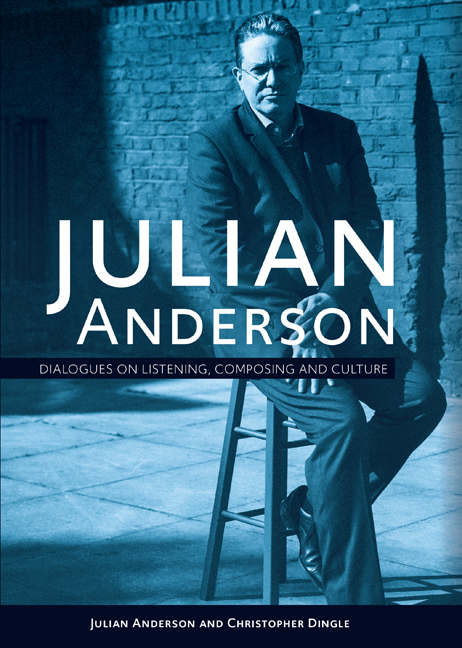Book contents
- Frontmatter
- Contents
- List of Illustrations
- Foreword
- Acknowledgements
- Introduction
- Prelude – Jeux: A Conversation Over Lunch
- Conversation One Origins
- Conversation Two Enthusiasms
- Conversation Three Training
- Conversation Four Dance
- Conversation Five Folk
- Conversation Six Composing (or Not)
- Conversation Seven Understandings
- Conversation Eight Beginnings (and Endings)
- Conversation Nine Puzzles
- Conversation Ten Singing
- Conversation Eleven Olly
- Conversation Twelve Memory
- Conversation Thirteen Opera
- Conversation Fourteen Practices
- Conversation Fifteen Outsiders?
- Conversation Sixteen Quartets
- Conversation Seventeen Advocacy
- Conversation Eighteen Partnerships
- Coda: Multiple Choices
- Chronology
- List of Personae
- Glossary of Musical Terms
- Macrotonality
- Catalogue of Published Works by Julian Anderson
- List of Recordings of Julian Anderson’s Music
- Bibliography
- Discography
- Index
Conversation Six - Composing (or Not)
Published online by Cambridge University Press: 16 September 2020
- Frontmatter
- Contents
- List of Illustrations
- Foreword
- Acknowledgements
- Introduction
- Prelude – Jeux: A Conversation Over Lunch
- Conversation One Origins
- Conversation Two Enthusiasms
- Conversation Three Training
- Conversation Four Dance
- Conversation Five Folk
- Conversation Six Composing (or Not)
- Conversation Seven Understandings
- Conversation Eight Beginnings (and Endings)
- Conversation Nine Puzzles
- Conversation Ten Singing
- Conversation Eleven Olly
- Conversation Twelve Memory
- Conversation Thirteen Opera
- Conversation Fourteen Practices
- Conversation Fifteen Outsiders?
- Conversation Sixteen Quartets
- Conversation Seventeen Advocacy
- Conversation Eighteen Partnerships
- Coda: Multiple Choices
- Chronology
- List of Personae
- Glossary of Musical Terms
- Macrotonality
- Catalogue of Published Works by Julian Anderson
- List of Recordings of Julian Anderson’s Music
- Bibliography
- Discography
- Index
Summary
This conversation starts off with Anderson reflecting on his broad approach to composition, before the discussion turns to different types of commission and different ways that he starts work on a piece, leading to a discussion of Poetry Nearing Silence and an early sketch for what would become Incantesimi. The importance of musical syntax is explored, as is the choice of language for verbal jottings, from which emerge discussions of rhythm and notation. The conversation then turns to the extent that any material can create associations for diverse audiences and Anderson's views on writing for amateurs or beginners, as well as the use of extended techniques and electronics. The conversation then looks at times when composing has been more difficult, with times of compositional crisis and works that are rejected, notably with writing what would become Fantasias. In the midst of this, the value of creative misunderstandings is also noted.
CD: You’ve composed in numerous genres, with everything from solo instrument via chamber music to large orchestra with soloists and chorus, and ranging from a small-scale piano etude lasting under a minute to an opera lasting around about 100 minutes. Your range is clear, but do you feel drawn to any particular vehicle for your expression?
JA: Yes. The sound of the orchestra inspired me to be a composer. My parents used to play radio broadcasts of orchestral music, or recordings on vinyl of orchestral music, or we’d hear it on the TV – there was a huge amount of classical music on mainstream TV until about 1995. When I first started to try to compose in my head, as a 9 or 10 year-old, it was orchestral music that I imagined. Having said that, I always wanted to assemble a balanced output without specialising in anything. I love writing opera and plan to write a second one, but I don't want to specialise in this or that or the other. Recently I’ve composed a lot of chamber music. I like to change the palette. But if there is a core focus, it's probably the orchestra.
- Type
- Chapter
- Information
- Julian AndersonDialogues on Listening, Composing and Culture, pp. 108 - 132Publisher: Boydell & BrewerPrint publication year: 2020



